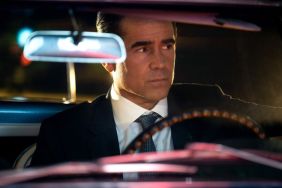Elijah Wood as Jonathan Safran Foer
Eugene Hutz as Alex
Boris Leskin as Grandfather
Mikki and Mouse as Sammy Davis Jr. Jr.
Summary:
Liev Schreiber’s directorial debut works better as a poignant drama about the Holocaust and finding Jewish identity, than it does as a madcap road trip comedy, but both sides form a wonderful musical travelogue of the Ukraine.
Story:
Jonathan Safran Foer (Elijah Wood), a nervous obsessive compulsive, travels to the Ukraine in search of his grandfather’s town and the woman that saved his life when it was wiped out by Nazis. There, he encounters an odd pair of tour guides, Alex (Eugene Hutz) and his “blind” grandfather (Boris Leskin), who drive Jonathan around on his journey, one that will forever change all of them.
Analysis:
With Everything is Illuminated, actor Liev Schreiber makes a glorious transition to bonafide filmmaker, taking on a rather difficult subject matter in this movie loosely based on part of Jonathan Safran Foer’s novel of the same name.
Schreiber’s film opens silently with Jonathan saying goodbye to his dying grandmother, and retrieving an item that takes him back to a similar moment with his grandfather years earlier. Jonathan is the family “collector,” placing odd mementoes into plastic bags and hanging them in a shrine to members of his family, both alive and dead. He knows little about his grandfather, a true enigma, but with an old picture of his grandfather with the woman who saved his life in hand, Jonathan starts his journey.
From there, we travel to Ukraine, where we’re introduced to Alex, a club-hopping party kid who sees himself as the epitome of hip and cool. His grandfather–who seems to think that he needs a “seeing eye b*tch”–has been hired by Jonathan to drive him around the country and Alex is brought on board as a translator. With few previous encounters with actual Americans, Alex tries to impress their visitor by greeting him at the train station with a full band.
From the start, it’s apparent to Jonathan that there is a severe language barrier, as well as some preconceived biases, at work. Most of the humor in the film’s first hour comes from the culture clash between Jonathan and his tour guides. Jonathan is a vegetarian, something unheard of in Eastern Europe apparently, and of course, he doesn’t understand a word that Alex’s grandfather is saying, probably a good thing since most of what comes out of his mouth is anti-Semitic.
There are some similarities between Elijah Wood’s characters in this film and the one he played in Lexi Alexander’s Hooligans, mainly since he’s playing an American in a foreign country, but the role doesn’t give him much room to show off any emotion as his character sullenly accepts his situation and rarely shows much emotion. For the most part, Wood is there just to act as a straight man to Alex and his grandfather, played by Boris Leskin, particularly in a scene involving a potato.
On the other hand, Eugene Hutz proves himself to be a rising star of the highest magnitude with the way he turns Alex into the focal point of the movie, bringing him through an amazing story arc that makes him almost unrecognizable by the end. His broken English narrative might remind some Americans of Russia’s most famous comedic export Yakov Smirnoff, but any comparison to that one-joke comedian should quickly be dispelled because Hutz is a fine actor, and even more impressive when you realize this is his first acting role ever. Although much of the film’s humor comes from the “lost in translation” routine between Jonathan, Alex and his grandfather, Hutz does amazing things with the comedy and then later, when the tone gets more serious.
And that’s really where the film’s biggest problem lies, because after an hour of non-stop laughs, the tone changes dramatically and things start to get serious as Jonathan and Alex begin to learn more about their respective heritages. This departure from the light-hearted humor that drove the first half brings far more depth to the characters and the story, but it’s such a sudden switch that anyone enjoying the film so far will be thrown for a loop.
The film’s vague ending is not particularly illuminated, because it’s a unclear exactly what we’re watching. Of course, I’ll use the “spoiler” excuse to make it seem like I figured it out, although there is a good chance that I missed some earlier clues. Either way, the ending certainly can be interpreted in a few different ways, and those already confused by the change in tone might be more upset by the numerous epilogues that kill what would have a perfectly fine ending point.
Regardless, the entire film looks gorgeous, thanks to the cinematography of Matthew Libatique (Requiem for a Dream), painting every scene with gorgeous colors. One particularly vivid scene that benefits from his eye is when the travelers come upon a field full of sunflowers as far as the eye can see. The soundtrack is quite wonderful thanks to the modernized Eastern folk music that keeps the first half of the film light and entertaining. Between discovering Hutz, hiring a visionary cinematographer and finding such great music, Schreiber ultimately wins out with his first attempt at directing despite the issues with the story and tone change.
The Bottom Line:
If you’re Jewish and lost relatives during the Holocaust, Schreiber’s directorial debut certainly will strike a powerful chord for you. If not, you’re still likely to enjoy the comedic aspects of his film, but will probably be slightly disappointed when it abruptly ends.
Everything is Illuminated opens today in New York and Los Angeles.










